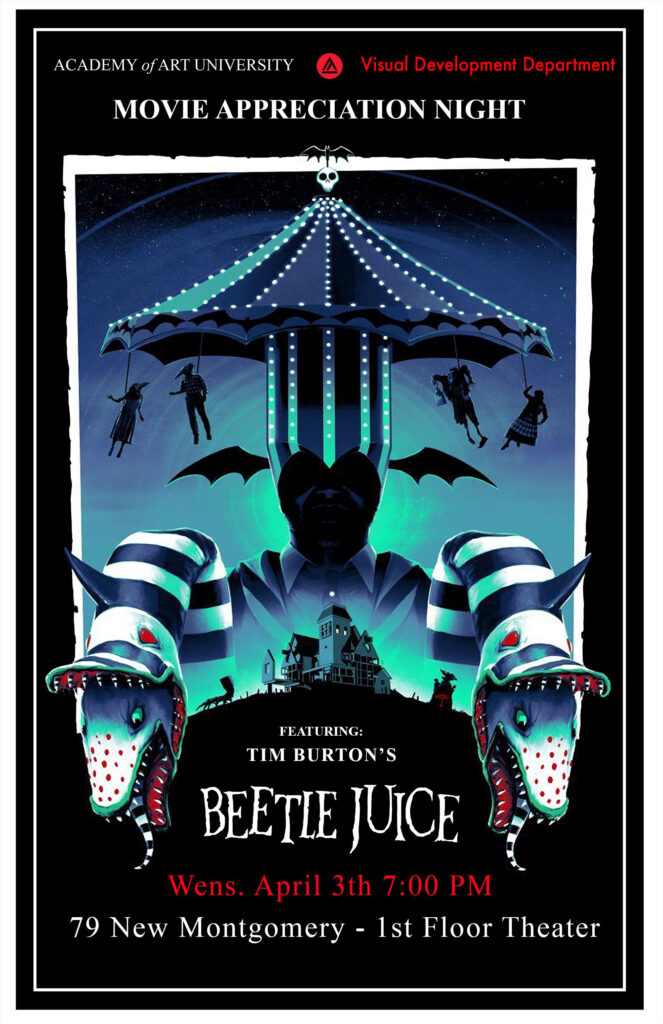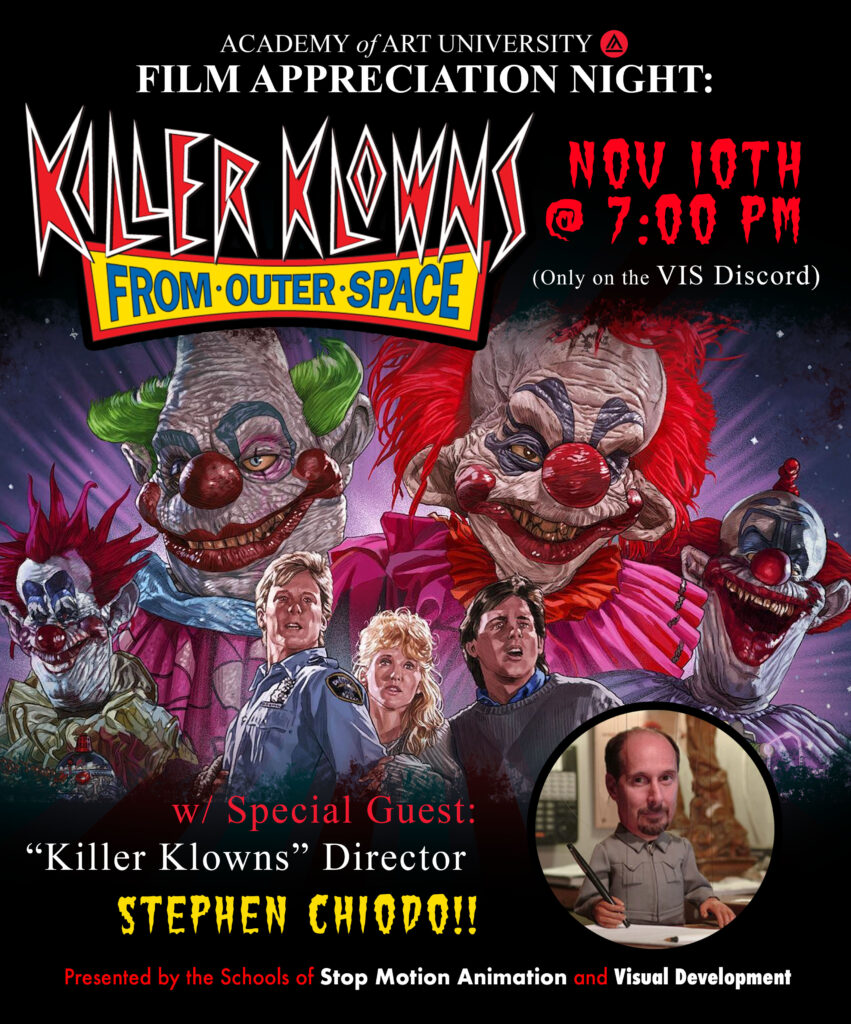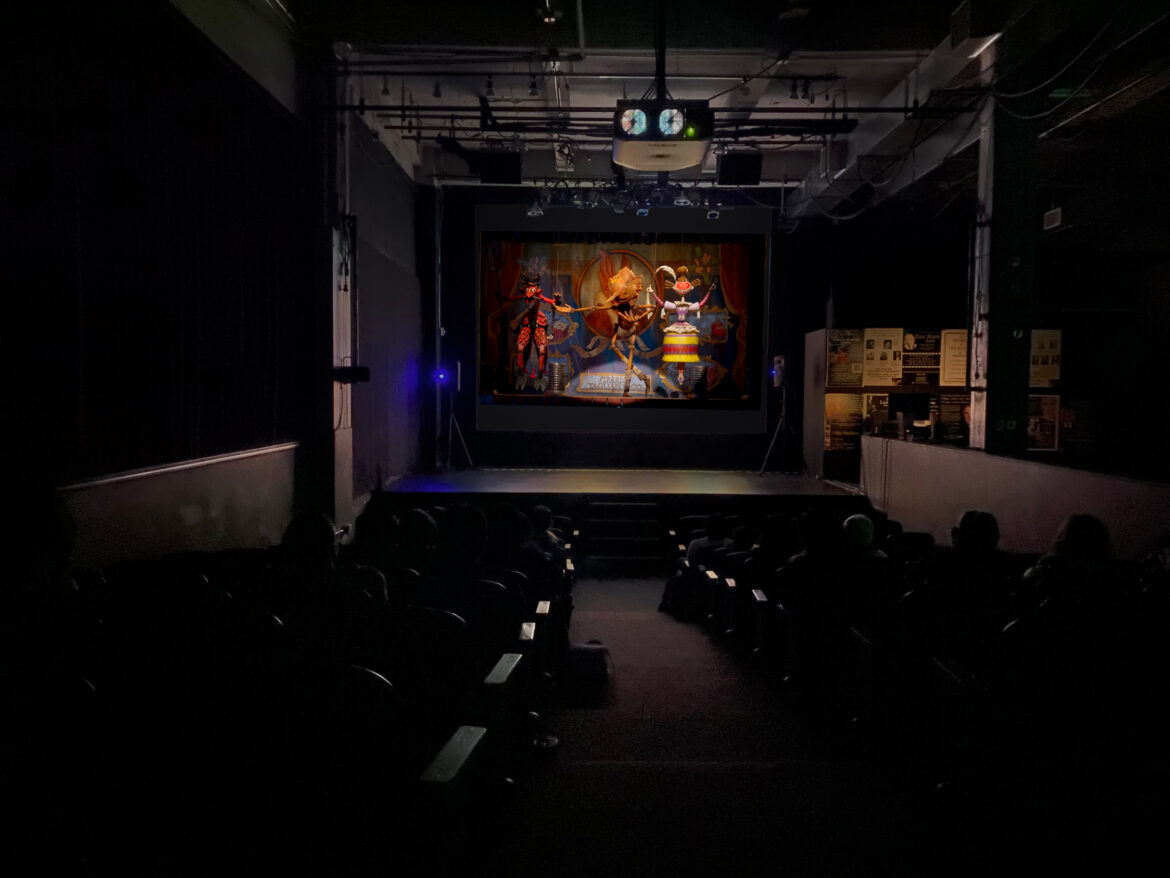By Isabella Cook
There’s something about film, animated and live-action alike, in a theater, laughing, crying, and gasping alongside fellow moviegoers while watching larger-than-life characters on the silver screen. The communal aspect surrounding cinema is central to the filmgoing experience, and until the COVID-19 pandemic, the experience of watching a movie along with others was, perhaps, taken for granted.
“One of the things that I love the most is when you go to a movie theater, you have people who don’t know each other, people from different cultures and ethnicities, with different opinions and worldviews,” said School of Visual Development and Traditional Animation Executive Director Nicolás Villarreal. “But in that moment, in the theater, they’re experiencing the same thing, and that’s the magic of movies and movie-making.”
Filling in cinematic blind spots

For Academy of Art University’s School of Visual Development (VIS), the popular Film Appreciation Nights began just before the onset of the pandemic as a movie-watching event, first for faculty and then as a fun but actionable way to address students’ lack of familiarity with classic films.
“We were finding that we were referencing films and movies in classes and lectures as examples for students to look at that they very often weren’t familiar with and that there was a whole breadth and scope of influences when it comes to movies that students might not have seen or been familiar with,” explained VIS Online Curriculum Coordinator Jeremy Saliba.
He added, “We kind of knew that it would benefit them to fill out their knowledge of movies and films that utilize really good design and that maybe some of the things they grew up with were actually informed by these older [films].”
VIS faculty realized that films like Ridley Scott’s “Blade Runner” and John Carpenter’s “The Thing” may not have been on their students’ radar because many of them were born well after the release of the movies. In addition, international students may have a vastly different experience with media exposure.
Regardless of the reason why these classic films were flying under the radar, the Academy’s film-loving instructors knew something had to change. VIS began the process of filling in their students’ cinematic blind spots by officially kicking off Film Appreciation Night with Tim Burton’s “Beetlejuice.”
“[W]e were big on Tim Burton and his design influence on art, on film, on games, in everything,” said Saliba. “And we thought ‘Beetlejuice’ would be fun.”
Throughout the course of the Film Appreciation Night series of events, movies are selected based on a variety of factors, including artistic influence, cultural significance, academic value, and no small amount of personal preference. Some of the films shown this past semester include “Star Wars: Return of the Jedi,” “Dune” (2021), and Carol Reed’s “The Third Man.”
Every Film Appreciation Night includes a brief presentation from VIS faculty. Through a series of slides, VIS addresses key details to attendees to not only enrich their viewing experience but also to build an understanding of the significant aspects of that evening’s film.
A pandemic pivot
Film Appreciation Night truly found its footing due to the pandemic-induced isolation in 2020, as it transitioned from an in-person event into a virtual setting. Students took to the virtual shift and found a sense of solace and camaraderie in sharing some cinema.
“Once the pandemic kicked in and we were all remote, that’s when we kind of really went for it,” said Saliba. “That first spring, we were doing about one a week over Discord at that point, sharing and streaming and everything because we were home and everyone was kind of available at that point.”

“Because that was one thing we could keep doing event-wise to keep students engaged, we started doing really rapid succession,” said VIS Associate Director Christopher Carman. “It was a full virtual experience at that point with our students, like everything else was.”
The virtual format also opened the doors for special guest speakers and Academy alumni to share their industry experience with Academy students. Among those that VIS has welcomed are alumna Desiree Ong, a graphic designer on the Oscar-winning “Guillermo de Toro’s Pinocchio,” FX makeup artist Bart Mixon, who discussed his work on “Robocop” (1987), “Killer Klowns” director Stephen Chiodo, and British film historian and author Charles Drazin who shared about “The Third Man.”
“All of our alumni are really cool people, so that’s been, for the most part, pretty easy,” said Carman. “Getting established industry veterans is a lot of times, just a matter of reaching out and letting them know what [Film Appreciation Night] is about. Most of them are more than excited to talk if they can put it in their schedule, especially now that we’re in the Zoom era; that’s opened up so many doors.”
A return to campus
This past spring, Film Appreciation Night returned to campus, where Academy students once again have the opportunity to share the cinematic experience in person.
“As we’ve come back on-site, we’ve migrated back to doing this hybrid format where we’re doing on-site and keeping the virtual group, too,” explained Carman.
Film Appreciation Night will be returning this fall in a hybrid format. Saliba and Carman shared that they would like to put together a special film marathon for Halloween.
“We’re going to try and book the theatre for the whole day or break it up over three days and do a film every day in succession,” said Carman, “But we’ll definitely do something special for Halloween because that’s our favorite time and those are our favorite movies.”
In the future, Villarreal hopes to use the platform of Film Appreciation Night to create a campus-wide film festival, complete with popcorn and a vibrant social component. He encourages students from all departments to come out to the in-person events on campus.
“Students need to try to come [to Film Appreciation Night] more because interacting with other students is very beneficial,” said Villarreal. “And going to the cinema causes conversation—it doesn’t matter if you’re right or wrong, it’s your perception. And films, they change your perception of the world in just two or three hours, and that’s the best part to me.”
